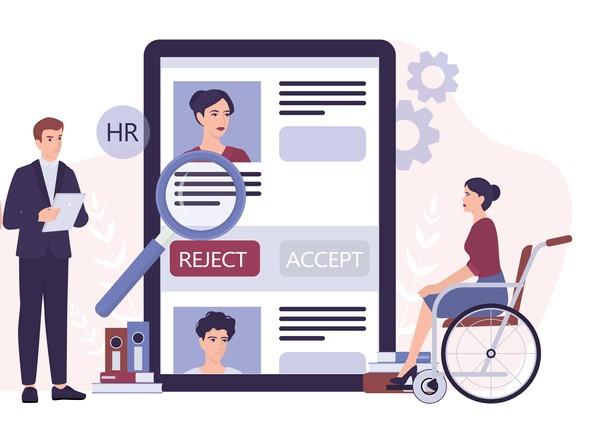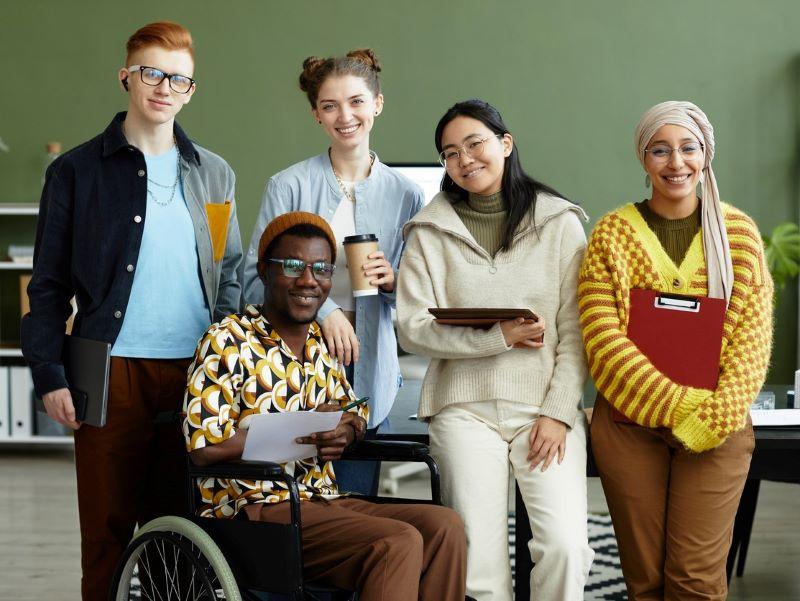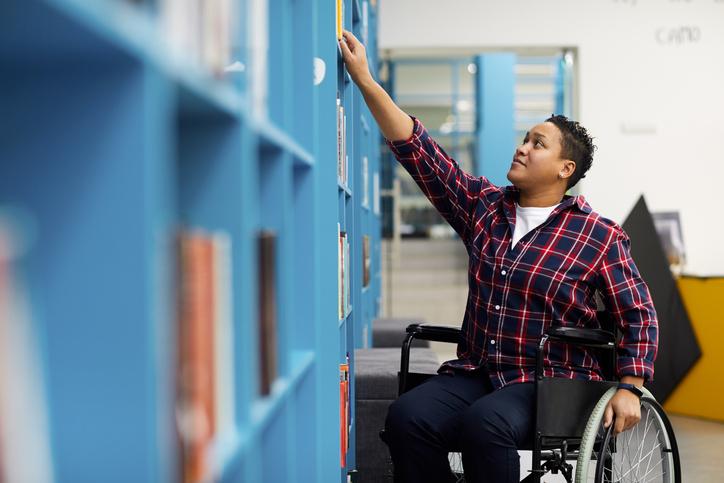Nearly 30 years ago, the UK introduced the Disability Discrimination Act (1995). This was superseded in England, Scotland and Wales by the Equality Act (2010). These acts were designed to protect disabled people from direct discrimination, failure to make a reasonable adjustment and victimisation across employment, education, transport, the provision of goods and the exercise of public functions.
Unfortunately, legislation is often ineffective because it is difficult to enforce. Today, disabled people remain less likely to hold a university degree, be employed or earn the same as their non-disabled counterparts. In response, our article offers 10 ways that universities can reject ableism to create a sense of belonging for disabled students and staff.
1. Inclusive attraction and selection processes
- Include disabled students and staff in your marketing literature and use inclusive language in your university prospectus and job postings.
- During the admissions process, account for the impacts of disability on students when measuring prior academic achievements, participation in extracurricular activities, volunteering or employment.
- Consider using alternative measures to productivity when making selection or promotion decisions for staff since measures such as publications, professional service or teaching load often disadvantage disabled people.
- Ensure reasonable adjustments are made during the selection process.
- Include disabled people on the hiring panel.
- Acknowledge the intersectionality of disability with gender, ethnicity and socio-economic background when making hiring or promotion decisions.
- Remember that the challenges disabled people have overcome may surprise you – the skills and tenacity they have developed can benefit your institution.
2. Awareness of additional barriers to overseas students and staff
- Consider that students and staff from overseas often have limited or no access to public funds for disability support and lack knowledge of the available support.
- Be aware that this lack of access to disability support means they often cannot show “proof” of their disability.
- Be prepared to translate medical records and paperwork from other languages into English.
3. Pre-emptive reasonable adjustments
- Begin arranging reasonable adjustments for students and staff at the point of student registration or acceptance of employment. These often take time to implement and must be available from day one.
- Do not question reasonable adjustments or emphasise the disabled student or staff member having to argue their case to a lecturer or line manager once it has already been assessed.
- Be aware that many people in academia are unlikely to disclose a disability – so foster an inclusive and accepting environment where disclosure of a disability is encouraged and validated.
- Do not request medical certificates for every brief period of absence where chronic conditions are disclosed. Trust your disabled students and staff.
4. Accessible and flexible learning, assessment and work opportunities
- Ensure lecture rooms and public spaces around the university are wheelchair accessible.
- Use captions or a sign-language interpreter, ensure images are tagged with alt-text, provide lecturer slides ahead of time and use different coloured paper to help people with dyslexia.
- Ensure that assessment processes are inclusive and avoid having multiple deadlines for the same module or across different modules due at the same time. This can help students to manage energy levels over time.
- Allow remote access to lectures and remote working for staff members. Take into account the needs of disabled staff when scheduling teaching sessions.
- Encourage flexible working hours and get management to lead by example to normalise this approach.
5. Representation of disability in classrooms and at conferences
- Research tells us it is “difficult to be what you cannot see”. Prospective students need to see disabled people represented by their peers and across academics who teach them.
- Conferences need to promote disability representation on their panels so that disabled people have a voice and can contribute to and shape the conversation.
- Ensure spaces of knowledge exchange and accommodation are accessible to all. Be proactive and make this a non-negotiable starting point.
- Provide accessibility information for all rooms and buildings (for example, lighting, size of the room, turning circles for wheelchairs, steps).
- Be aware that we are still amid a pandemic. Keep mask mandates and offer remote participation. Show you care about others who are clinically vulnerable.
6. Listen to the needs of disabled people but be aware of advocacy exhaustion
- Ask disabled students and colleagues how you can make things better. Engage with them, listen to their suggestions and take action.
- Think about what signals your actions send. If you drop mask mandates during a pandemic and force everyone to attend lectures in person, what does that say about your regard for immunocompromised individuals?
- Watch out for advocacy exhaustion and act as an ally to facilitate systemic cultural change. Commit to accessibility before people have to ask.
7. Staff training: no one-size-fits-all approach
- Keep guidelines documented, current and continuously under review. Acknowledge that the guidelines are considered the minimum action required.
- Create safe spaces for formal and informal training to showcase positive and negative experiences and develop a system to learn from both outcomes.
- Admit flaws, be open to change and look for solutions rather than putting up or maintaining pre-existing barriers.
- Be aware that academics who make accommodations for their students may also need accommodations for themselves.
- Look for ways to overcome resistance from academics to make reasonable adjustments. Is it a lack of empathy? A lack of time? Or something else?
8. Dedicated disability person in each department
- Tasking an academic to act as a disability representative or coordinator for a department is not a good idea – each department requires a person specifically employed for pastoral care and disability-related advice.
- These individuals need to be accountable for ensuring students and academics receive reasonable adjustments and to challenge pushback from others on their behalf.
9. Mental health and career support
- Be aware that the Covid-19 pandemic exacerbated pre-existing mental health challenges within the university context.
- Ensure students and staff can access mental health support services promptly and for as long as required. At present, mental health support for staff is severely lacking.
- Individuals with physical disabilities often require mental health support, not just workplace adaptions.
- Recent research has shown a link between access to career guidance and well-being. Universities must promote the available services and ensure adequate resources to meet demand.
10. Look for knowledge-sharing opportunities
- Be an ally and actively consider ways to improve access for disabled people.
- Partner with charities to run training sessions and provide one-to-one tailored support.
- Share knowledge with other universities and engage with the industry to share best practices.
We conclude by acknowledging how anyone at any time can become disabled, since only 17 per cent of disabled people were born with a disability. Unfortunately, disability discrimination laws are not as effective as intended or as some non-disabled people perceive. We call for everyone who is part of the higher education ecosystem to advocate for the rejection of ableism and for systematic change. The suggestions here are just a start. We can do better. We must do better. We can all benefit.
William E. Donald is an associate professor in sustainable careers and human resource management at the Ronin Institute (US) and the University of Southampton (UK).
Larisa Yarovaya is an associate professor of finance at the University of Southampton and a diversity officer in financial management special interest group at the British Academy of Management.
The authors would like to thank those in the higher education ecosystem for sharing their insights that helped to inform this article.
If you would like advice and insight from academics and university staff delivered direct to your inbox each week, sign up for the Campus newsletter.




comment2
(No subject)
(No subject)